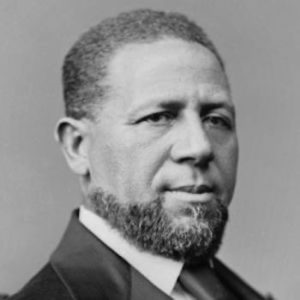
Hiram Revels
Hiram R. (Rhodes) Revels was born on this date in 1822. He was a Black educator, minister, politician, and the first Black person to serve in the United States Senate.
He was born in Fayetteville, N.C. He was born free, but all blacks in the Antebellum South, free or slaves, were forbidden to learn to read and write. Another free Black woman secretly taught revels these basics. When he was 15, his family moved to Lincolnton, N.C., where Revels worked as a barber. In 1844, he moved to Indiana (a free state) and began studying at Beech Grove Seminary, a Quaker school.
At this time, Revels became involved with the teachings of the African Methodist Episcopal Church. The Black Church was a significant religious and educational force in the Black community. In 1845, Revels began studying for the ministry in Drake County, Ohio. Later that year, he was ordained as a minister of the AME Church and made an elder in 1849.
Revels, an itinerant preacher, was imprisoned in Missouri in 1854 for preaching the gospel to Negroes. In the early 1850s, Revels married Phoeba A. Bass, raising six daughters together. One of them, Susie became a newspaper editor in Seattle. He attended Knox College in Galesburg, IL, and in 1857, he became a minister and the principal of a Black high school in Baltimore, Maryland.
When the American Civil War started, Revels helped organize Union regiments and recruit soldiers of the first colored regiment in Maryland. He established a school for freedmen in St. Louis in 1863 and worked with the U.S. Provost Marshall to handle the affairs of ex-slaves.
In 1865, Revels joined the Methodist Episcopal (ME) Church, which offered more opportunities for his work in the South. After the Civil War, the Reconstruction Act of 1867 required the Southern states to write new constitutions permitting Blacks to vote and hold public office. This was the Fourteenth Amendment, and on July 28, 1868, Blacks were officially recognized as citizens of the United States.
Later that year, Revels was appointed for a term on the Natchez City board of aldermen. During the first session of the Mississippi legislature in January 1868, Revels was asked to open the session with a prayer. According to John R. Lynch, "That prayer-—one of the most impressive and eloquent prayers that had ever been delivered in the [Mississippi] Senate Chamber-made Revels a United States Senator. He made a profound impression upon all who heard him. It impressed those who heard it that Revels was not only a man of great natural ability but that he was also a man of superior attainments."
In 1869, Lynch, a Black political figure from Natchez, encouraged him to enter as a state senator candidate representing Adams County. Revels accepted the nomination at the Republican caucus in December 1869.
In January 1870, Mississippi elected Hiram Revels as a U.S. senator. Mississippi was readmitted to the Union, but the New York Herald predicted that Revels would never be allowed to take his Senate seat. Finally, he was seated on February 25, 1870, and held the office until March 3, 1871, becoming the first Black member of Congress. During Revels' short tenure, he introduced several bills, presented several petitions, and served on the Committee on the District of Columbia and the Committee on Education. After his term in the Senate, Revels became president of Alcorn College from 1871 to 1873.
He then re-entered the ministry as the Holly Springs, Mississippi, ME church Pastor. In 1876, he returned to Alcorn College until 1882, then taught theology at Rust College in Holly Springs. On January 16, 1901, Hiram Revels died of a stroke.
Black Americans In Congress, 1870-1989.
Bruce A. Ragsdale & Joel D. Treese
U.S. Government Printing Office
Raymond W. Smock, historian, and Director 1990
E185.96.R25